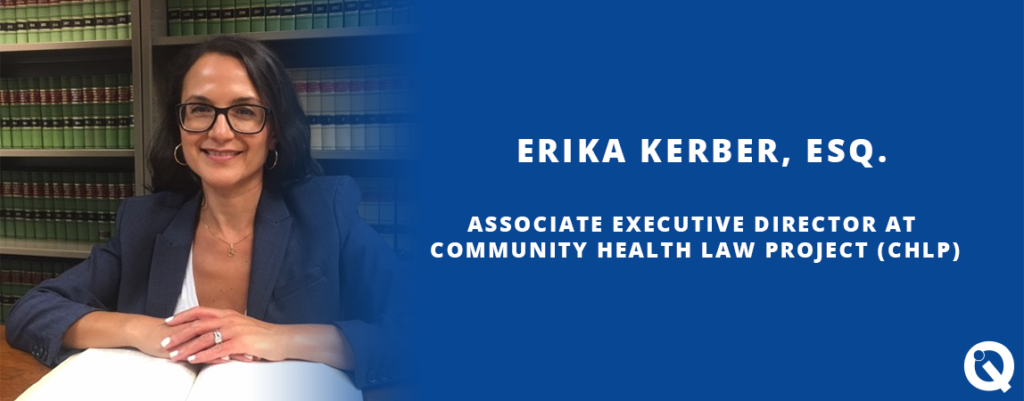Erika Kerber, Esq., Associate Executive Director at Community Health Law Project (CHLP).
Who is eligible to receive services through CHLP?
CHLP is a non-profit legal services organization that provides free legal and advocacy assistance and representation in civil matters to low-income New Jersey residents with disabilities, those with chronic health conditions, and the frail elderly. We have been in existence for more than 40 years with offices throughout the state. I should say that the demand for our services far exceeds our resources; unfortunately, we cannot assist everyone who needs us.
How does legal support impact the health of the people you serve?
Our mission is to assist the most vulnerable residents of our state with legal issues that affect their daily subsistence and ability to successfully live and thrive in the community. We therefore focus on housing issues such as evictions, foreclosures, habitability, and utility shut-offs; public entitlements such as SSI/SSD, welfare, and food stamps; family issues, such as domestic violence and child support; consumer issues such as debt-collection; home health care issues involving private duty nursing, home health aides, and durable medical equipment. We also help individuals who need Wills, Living Wills, Powers of Attorney, and Guardianships.
We also provide assistance in the areas of discrimination and public accommodations. We focus on social determinants of health, which we know determine about 80 percent of an individual’s overall health outcomes. Extensive data shows that if a person’s basic life necessities are compromised, their health deteriorates and they are, in turn, more prone to be frequent utilizers of ER’s and hospital systems. On the other hand, studies indicate that incorporating legal interventions to address basic life needs improves overall health and reduces health care costs.
Tell us about the “Medical-Legal Partnership” model and how it works.
A medical-legal partnership is where we partner with health care providers by meeting with patients on-site at the health care facility and we screen them for any legal issues that may be impeding their health.
We also become part of the treatment team so that patients are treated holistically by addressing both their medical issues and social determinants of health in an integrated way. The medical-legal partnership model takes a proactive approach as opposed to a reactive approach in addressing patients’ life issues. Additionally, the medical-legal partnership model can assist health care providers as they move toward providing value-based care. Medical-legal partnerships have been shown to decrease preventable hospital readmissions, especially for patients who are high utilizers, by providing a relatively low cost intervention to help stabilize patients. CHLP has developed several small-scale medical-legal partnerships with health care providers around the state.
How did your work change as a result of COVID-19?
Like most organizations, we had to quickly transition our staff to work from home. All of our staff members have continued to assist clients, field calls, and educate consumers and providers about the Executive Orders, Administrative Orders, and other directives issued as a result of the pandemic. This includes information related to the moratorium on evictions and other housing related issues, unemployment benefits, and stimulus payments.
How can Quality Institute members work with you to serve their vulnerable patients?
Members can refer patients/consumers to one of our offices for assistance. But as I previously mentioned, the demand for our services far exceeds our resources. Moreover, many clients are referred to us when they are at a crisis point and our options are therefore limited to assist them, such as when a client calls after they’ve already been evicted from their home. The more ideal model is the medical-legal partnership.

